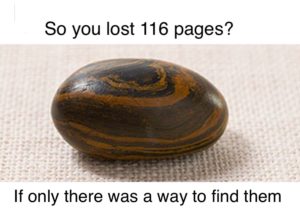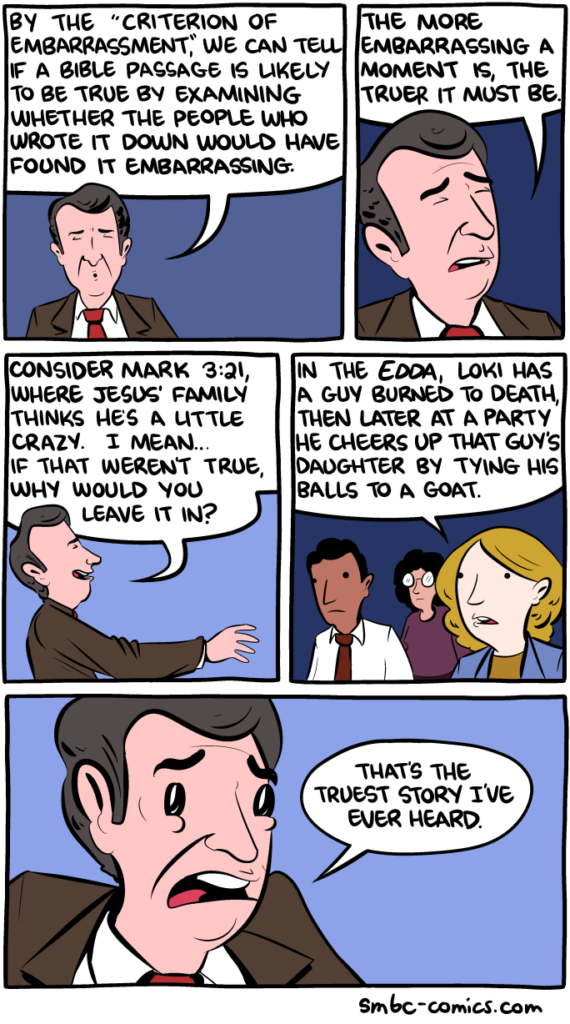“Remember the New Covenant, Even the Book of Mormon”
Reading assignment
Joseph Smith—History 1:27–65; Doctrine and Covenants 3; 5; 10; 17; 20:5–15; 84:54–62; Our Heritage, pages 5–10.
Links: Teacher’s manual | Student manual
It’s a busy year for Your Humble Godless Doctrine teacher. So I’m posting this lesson as kind of a rough outline, with the intention of filling in the details later. Think of this as the notes that a Gospel Doctrine teacher would walk into class with.
Reading
Says the manual:
• When Joseph was 17 years old, he was visited by Moroni.
Actually, in the early days it was Nephi. Then the story changed, as made-up stories do.

More info here: http://www.mormonthink.com/nephiweb.htm
The 116 pages
From the manual:
One example of the miraculous preservation of the Book of Mormon occurred when one of Joseph Smith’s scribes, Martin Harris, lost 116 pages of the translated manuscript. Ask the assigned class member to summarize this account (see “Preparation,” item 3.) Then teach and discuss D&C 3 and D&C 10, which the Lord revealed after the pages were lost.
Here’s my summary:
Martin Harris was a credulous boob who fell for every religious scam going around in the 1830s. He mortgaged his house to pay for the publication of the Book of Mormon. Not coincidentally, he stood to gain handsomely if the book succeeded, and would lose his house if it failed. One obstacle was his wife, Lucy. Apparently she wanted some evidence that the book was legitimate, so Martin Harris pestered Joseph into lending him the draft of the manuscript, which amounted to 116 pages. The manuscript was lost, perhaps burned by Lucy Harris.
At this point, a god would have several options. He could have Smith retranslate the pages word for word, which would be very good evidence that he was not making it all up on the fly. Since the Book of Mormon was a scam, this option wasn’t available.
Instead, Smith created retconned the thing by writing a rather implausible bit into the Book of Mormon about how Nephi felt inspired to rewrite large chunks onto the plates a second time, so that Smith could translate them.
1 Nephi 9:3 Nevertheless, I have received a commandment of the Lord that I should make these plates, for the special purpose that there should be an account engraven of the ministry of my people.
9:4 Upon the other plates should be engraven an account of the reign of the kings, and the wars and contentions of my people; wherefore these plates are for the more part of the ministry; and the other plates are for the more part of the reign of the kings and the wars and contentions of my people.
9:5 Wherefore, the Lord hath commanded me to make these plates for a wise purpose in him, which purpose I know not.
God, for his part, helped cover the mess by explaining that retranslation wasn’t an option because someone probably changed the words in a cunning plan to trap Smith.
D&C 10:8 And because you have delivered the writings into his hands, behold, wicked men have taken them from you.
9 Therefore, you have delivered them up, yea, that which was sacred, unto wickedness.
10 And, behold, Satan hath put it into their hearts to alter the words which you have caused to be written, or which you have translated, which have gone out of your hands.
11 And behold, I say unto you, that because they have altered the words, they read contrary from that which you translated and caused to be written;
12 And, on this wise, the devil has sought to lay a cunning plan, that he may destroy this work;
13 For he hath put into their hearts to do this, that by lying they may say they have caught you in the words which you have pretended to translate.
14 Verily, I say unto you, that I will not suffer that Satan shall accomplish his evil design in this thing.
15 For behold, he has put it into their hearts to get thee to tempt the Lord thy God, in asking to translate it over again.
16 And then, behold, they say and think in their hearts: We will see if God has given him power to translate; if so, he will also give him power again;
17 And if God giveth him power again, or if he translates again, or, in other words, if he bringeth forth the same words, behold, we have the same with us, and we have altered them;
18 Therefore they will not agree, and we will say that he has lied in his words, and that he has no gift, and that he has no power;
19 Therefore we will destroy him, and also the work; and we will do this that we may not be ashamed in the end, and that we may get glory of the world.
Ask: Were there any better ways that a god could used in accomplishing this?
Here’s another cartoonist’s idea.
Smith should have been grateful to Lucy Harris. Many writers would benefit from losing a first draft and having to write it all again, now that they have the idea in their minds. The rest of the Book of Mormon would have better if Smith had done this; compare the rollicking adventure tale of 1 Nephi to the tedium of everything else.
Criterion of embarrassment
Some people have pointed to this episode as evidence for the prophetic veracity of Joseph Smith, even though it’s anything but. The rationale goes like this: God was calling Smith out for his weakness, and if Joseph really had been a self-aggrandising phoney, then he wouldn’t have included a long bit about his failings. He would have hidden it, or left it out. In short, if it’s embarrassing to the author, it must be true.
Well, as it turns out, Smith did lots of embarrassing things that he did manage to cover, and we’ll get to them in subsequent lessons.
Besides, if a story is embarrassing, that doesn’t mean it’s true. SMBC has an example.
The Three and Eight Witnesses
From the manual:
•Who were the Three Witnesses and the Eight Witnesses to the Book of Mormon? (See “The Testimony of Three Witnesses” and “The Testimony of Eight Witnesses” in the introductory material of the Book of Mormon; see also Our Heritage, page 10.) In what ways can you be a witness of the Book of Mormon? (See Moroni 10:3–5.)
The Witnesses were people who stood to gain from the success of the Book of Mormon. Many were also members of the same family.
Mark Twain wrote:
Some people have to have a world of evidence before they can come anywhere in the neighborhood of believing anything; but for me, when a man tells me that he has “seen the engravings which are upon the plates,” and not only that, but an angel was there at the time, and saw him see them, and probably took his receipt for it, I am very far on the road to conviction, no matter whether I ever heard of that man before or not, and even if I do not know the name of the angel, or his nationality either.
…
And when I am far on the road to conviction, and eight men, be they grammatical or otherwise, come forward and tell me that they have seen the plates too; and not only seen those plates but “hefted” them, I am convinced. I could not feel more satisfied and at rest if the entire Whitmer family had testified.
It wouldn’t have mattered if there were 11 witnesses or 100 witnesses. That’s not how evidence works; it must be publicly available to be valid. See this lesson for more about the witnesses to the Book of Mormon.
More info at this page: http://cesletter.org/debunking-fairmormon/witnesses.html
and this one: http://www.mormonthink.com/witnessesweb.htm



25 January 2017 at 3:11 am
I love this website! Any way you could post these on Saturday instead of Sunday? I’d like to be more prepared when I walk into Gospel Doctrine with my TBM wife.
29 January 2017 at 9:45 pm
Hopefully today’s lesson will put me a week ahead! Thanks for reading.